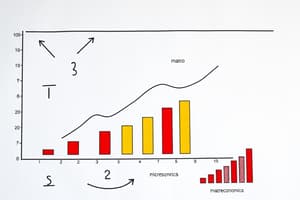Podcast
Questions and Answers
What aspect of economics does microeconomics focus on?
What aspect of economics does microeconomics focus on?
- Individual agents such as consumers and firms (correct)
- National income and employment
- Aggregate level of GDP
- Trade theory
Which of the following best describes the scope of macroeconomics?
Which of the following best describes the scope of macroeconomics?
- Studying individual consumer behaviors
- Analyzing price determination and consumer demand
- Examining factors affecting entire economies (correct)
- Understanding supply and demand
What is a key focus of microeconomic theories?
What is a key focus of microeconomic theories?
- Understanding market behavior of individual agents (correct)
- Analyzing national income trends
- Examining fiscal policy
- Studying global trade theories
Which branch of economics focuses on the big picture, including factors like GDP and employment?
Which branch of economics focuses on the big picture, including factors like GDP and employment?
What does macroeconomics primarily study in terms of economic policies?
What does macroeconomics primarily study in terms of economic policies?
In what way do microeconomics and macroeconomics differ?
In what way do microeconomics and macroeconomics differ?
Flashcards are hidden until you start studying
Study Notes
Economics is a multifaceted discipline dealing with matters of production, distribution, allocation, exchange, and consumption of goods and services. It's a field concerned with how societies distribute wealth, income, utilities, and risks among different members and groups within it.
Microeconomics focuses on individual agents such as consumers and firms, their decisions, and behaviors. This branch studies the behavior of individuals in markets, the workings of supply and demand, and why and how consumers make certain choices regarding what they buy or sell, how much money to spend or save, etc.. Microeconomic theories are used to analyze economic problems at both the individual and firm levels, as well as market outcomes like price determination, output supply, and consumer demand.
Macroeconomics, on the other hand, encompasses broad aspects of the economy, looking at factors affecting the entire nation, region, continent, or even global economies. This level focuses more on understanding the big picture—the aggregate level of GDP, national income, employment, unemployment, inflation, interest rates, and so forth. Macro economics also looks into economic policy issues such as fiscal policy, monetary policy, and trade theory. In essence, while microeconomics looks at the small scale, detailing specific parts of the economy, macroeconomics takes a broader perspective, examining large scale patterns, trends, and overall health of the economy.
In summary, economics deals with the study of how resources are allocated. Both micro and macroeconomics play important roles in this area by studying particular components and general tendencies respectively. By investigating these smaller units and larger themes, one can better understand the complexities and dynamics of economic activity, ultimately leading to improved decision making, problem solving skills, and a deeper comprehension of our economic landscape.
Studying That Suits You
Use AI to generate personalized quizzes and flashcards to suit your learning preferences.




